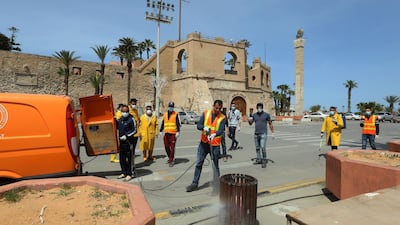Senior officials from the International Follow-up Committee on Libya on Thursday repeated their call for a ceasefire after the UN warned the coronavirus outbreak posed a grave threat to the country.
Those taking part in the Berlin Conference, held in January, stressed the need for an end to fighting in a video conference chaired by acting UN special representative of the Secretary General, Stephanie Williams.
The UN on Wednesday warned that Libya could prove extremely vulnerable to the fast-spreading coronavirus.
Libya has confirmed only a handful of cases so far.
But the UN's Office for the Co-ordination of Humanitarian Affairs warned the country is at high risk because of its level of insecurity, weak health system and high numbers of migrants, refugees and internally displaced".
Stephane Dujarric, spokesman for UN Secretary General Antonio Guterres, announced the agency was suspending humanitarian operations in Libya amid continued fighting over the capital, Tripoli.
At the Berlin summit in late January, Turkey and other foreign players in Libya pledged to respect an arms embargo and support a truce.
Fighting in the country has intensified in recent days, despite the latest pledges by both sides to accept UN and international calls for a ceasefire to help contain the virus.
Battles erupted this week on several fronts in a new escalation after months of suspected imports of weapons and foreign fighters in breach of an arms embargo.
The country will mark one year of a renewed round of violence on Saturday.
Libya has been gripped by chaos for almost a decade, since longtime dictator Muammar Qaddafi was brought down and killed in a 2011 uprising backed by several western powers.
It is now split between the Government of National Accord in Tripoli and forces loyal to Field Marshal Khalifa Haftar.
Field Marshal Haftar launched an offensive to try to capture the capital from the GNA and the militias it employs to defend it on April 4 last year.

